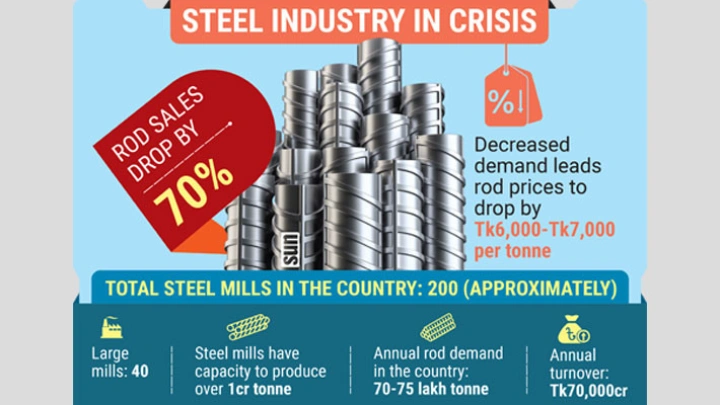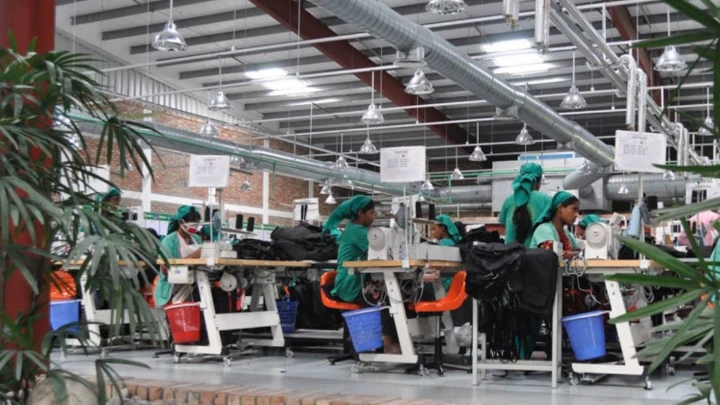Worries mount in business sector amid lingering unrest
DailySun || Shining BD
The country’s business community remains deeply concerned, as law and order in business operations has yet to be fully restored following the ousting of the fascist Awami League regime amid the student-led mass uprising on 5 August this year, threatening economic stability.
Economists and business leaders warn that the economy could face significant challenges if both short- and long-term security measures are not promptly implemented.
Several businesspersons said they were still afraid to go to their factories due to the poor law and order situation in the country. The month-long labour unrest in the garment factories – particularly those in Ashulia and Gazipur – hampered production, which clogs in the country’s exports.
They also claimed that Bangladesh may lose export orders for readymade garment (RMG) worth $2-5 billion in the next six months if the situation does not improve.
Talking to the Daily Sun, Rising Apparels Managing Director Mahmud Hasan Khan Babu claimed that they were facing severe challenges due to the insecure business environment in the country.
“Despite getting magistracy powers, the army could not ensure law and order in the garment industry. The law enforcement agencies could ensure the security, but we have not seen any visible result of that here yet. The labour unrest has been continuing for a month, which vastly hampers the industry’s exports,” he added.
Mahmud pointed out that the business community is facing several challenges such as complexity in customs department, HS codes based on products, cost of doing business, gas and electricity crisis, high bank interest rate, and high inflation.
“Harassment by customs officials should be stopped to relax the businessmen. Besides, a uniform HS code should be ensured. Moreover, the cost of doing business has increased alarmingly in the country which hinders our competitiveness in the global market,” he also stated.
He added that the insecurity in businesses halted new investments, which has a negative effect on employment and economic growth. In the last one month, the security has somewhat improved but not restored fully.
According to the Bangladesh Garment Manufacturers and Exporters Association (BGMEA), production at nine factories was halted on Monday due demonstrations by workers to press home their various demands. Of them, seven were situated at Savar, Ashulia and Jirani region.
The RMG sector exported $47 billion in 2023 which was 84% of the country’s total exports.
Bangladesh Knitwear Manufacturers and Exporters Association (BKMEA) President Mohammad Hatem said a good understanding and relation between the owners, workers and labour leaders can mitigate any unrest as well as violence in the factories.
“When factory owners do not get fair prices from the buyers, they have to suffer for that, and most of the people – even the labourers – do not know about this issue. I request the Bangladesh Bank to allow the industry owners adequate time to repay their loans,” he added.
He also echoed the same problem of the gas crisis in the industries that causes lower productivity, resulting in shipment delays.
PRAN-RFL Group Chairman and Chief Executive Officer Ahsan Khan Chowdhury said at a recent programme, “We are in trouble. Today, I am afraid to go to the factory. I fear whether I would be able to come out alive or not. If the businessmen are afraid to go to their factories like that, then they will not be able to conduct business activities in the coming days.”
He added that Bangladesh could be “the factory of the world” for its immense potential. The main task of the business community is to create employment, but sometimes, it faces a setback due to labour unrest.
“We want a peaceful environment to conduct businesses. Those who are currently trying to take unfair advantages of the weak law and order situation should be brought to book,” he also said.
Leather Goods and Footwear Manufacturers and Exporters Association of Bangladesh President Syed Nasim Manzur said the businessmen now feel insecure due to the labour unrest and vandalism. Moreover, food or service consumption by the consumers has fallen remarkably.
“The double-digit rate of interest on industrial loans is not viable for sustaining in the competitive market. FDI is needed for a country like Bangladesh, but due to the investors’ low confidence, it remains stagnant now. However, I hope that it will see a positive move within a few days,” he also said.
Nasim said the government’s administrative system is still not working properly, which plays a role in lowering the investors’ confidence.
Policy Exchange Bangladesh Chairman and CEO Dr M Masrur Reaz said, “We could not take the right policy at the right time and that caused a macro-economic crisis in the recent past. The confidence level for investment is shattered now. The law and order – especially disorder in the ‘order’ part, labour unrest, and inflation are some of the pressing issues for the macroeconomic challenges for Bangladesh.”
“We have recently seen commendable progress in the banking sector reforms, but we are yet to see policy governance in other areas. We have to keep our dollar reserve stable by remittance, export, FDI, and gaining investors’ confidence is most important for that,” he also said.
Dr Masrur said, “If inflation is not controlled by increasing the interest rate of bank loans, it will be more serious, so we need to focus more on supply chain management.”
Shining BD























